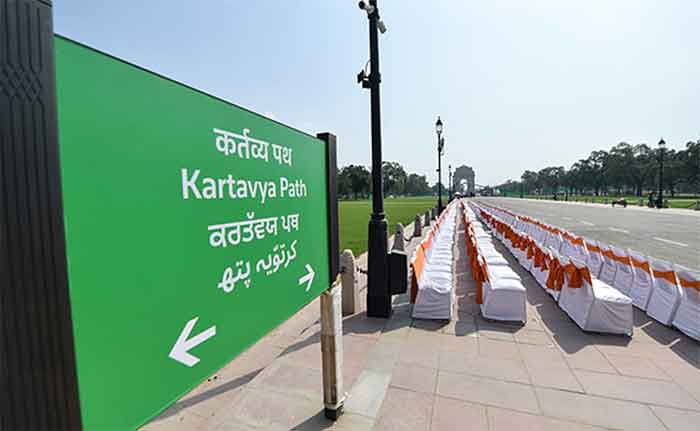
The unveiling of the Subhash Chandra Bose statute by the Prime Minister of India marking the inauguration of the ‘Kartavya Path,’ the revamped Central Vista Avenue, has at least three objectives attached to it. One, it allows the BJP to add some momentum for the 2024 elections by staging the arrival of a ‘refreshed’ India. Second, it provides it with an opportunity to make an ideological assertion vis-à-vis history. And third, it steals the limelight from the recently launched ‘Bharat Jodo’ campaign of the Congress party.
The Prime Minister of India, while unveiling the statute, made explicit insincere references to history. He announced the ‘erasure’ of a symbol of ‘slavery’ forever and asserted the arrival of a ‘new history.’ He hastily announced it as freedom from ‘yet another symbol of slavery of the British Raj.’ This evaluation of the Rajpath is myopic. When Kingsway was renamed Rajpath, it already, in a way, symbolically dissociated from being a symbol of colonial power and belonged at once to the people of India. The nature of sovereignty in a colonial setup and independent India is quite distinct. However, the Prime Minister does not care for such conceptual and factual matters. The symbolic significance of choosing Subhash Chandra Bose, rivalling Mahatma Gandhi, Bhim Rao Ambedkar or Jawaharlal Nehru and many others, signifies the militaristic intention and implication of the political message. Communal harmony, the abolition of caste, or the efforts to take India to an inclusive, ‘modern’ and ‘scientific’ future is not a priority anymore. Instead, anger, rage, and impatience, supplemented by the merger of demands of people into the will of the (authoritarian) state, are of utmost importance.
The Prime Minister’s disturbing claim of ‘liberating’ India from an ‘embarrassing’ history has dark overtones of fascist tendencies that existed within the Indian National Movement in the early twentieth century. What is significant to this political communication is a sense of shame attached to the history. For the BJP, the past is shameful. For it conveys that it was of subjugation only. However, the difficult reality is that it was devoid of BJP (its historic roots). The BJP cannot claim history. Therefore, it has creatively marched on to pervert and destroy it. It achieves two goals in doing so. Avoid any discussion of its presence in history and, at the same time, reset the terms of the conversation about the future.
Some commentators have argued that the revamped central vista is a step forward towards infrastructure building in India. Such assertions geared toward sucking up to political power overlook other possibilities of futuristic infrastructure that could have been built for the country. In a time when a financial crisis is looming over the world, inflation and unemployment are high; such a splurge in post-covid times can only mean wastefulness. The same amount of money could have been used to strengthen the public health infrastructure in the country. Rather than attempting ridiculous political acrobatics, the Prime Minister should have focused on the more recent ‘shameful’ history of India, where corpses were floating in the river Ganga, where citizens were dying due to a lack of oxygen cylinders and workers were rendered homeless and unemployed with no means to survive during the pandemic. The Prime Minister could have taken grand steps to eradicate the practice of casteism, a much bigger shameful history of India which survives despite all efforts. But it seems grandeur and glory triumph over pain and suffering, and the state is superior to its citizens.
While escaping his own duties, in his address, the Prime Minister outlined his expectations from a dutiful citizen. The burden of duty is a heavy one. It forecloses the potential of asking questions in return. It only expects compliance in the service of an expectation which is non-negotiable. Nothing will befit the current ruling dispensation more than reminding citizens of their duty. However, some would argue that it is a perfect recipe for authoritarianism. The politics of nomenclature and the populist currency it has is once again brought to the forefront by renaming the Rajpath to Kartavya Path. While there was nothing wrong with it being the Rajpath, the current government thought it opportune to gain political mileage by signalling that the project of carving out a ‘new India’, where the distinction between the friend and foe is clear, was totally on. It is a vision of a ‘political community’ that imagines itself by reconfiguring political life by creating distinctions between insiders and outsiders aimed at achieving political homogenization. All foes of ‘new India’ who demand inclusion, equality, secularism, welfare measures, education, and employment must be constantly undermined or made to submit to the madness of nationalism. That is what appears to be the thrust at the moment.
Javed Iqbal Wani, Assistant Professor, School of Law, Governance & Citizenship, Ambedkar University, Delhi











































